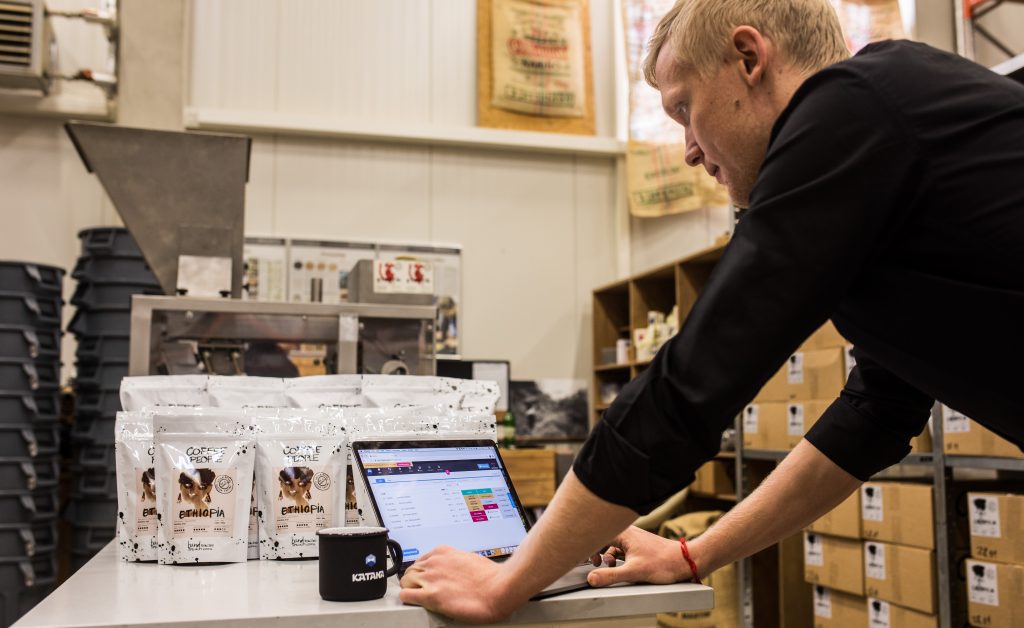10 common manufacturing challenges businesses have to face

Capt’n on deck!
You’re at the helm of your brand-new manufacturing business. But, being the eager entrepreneur that you are, you’ve decided to set sail without even checking if your business is seaworthy.
You launch, but quickly your company begins to take on water.
You’re able to steer your way through the problems even though water is pouring in. But eventually, as you reach deeper seas, you continue to sink under the waves until your business is submerged and lost to the murky waters of bad business planning.
You don’t have to abandon this metaphorically sinking ship. By understanding manufacturing challenges that could befall your company and having the solutions in place before they occur will help you overcome the treacherous seas and find those calmer waters.
So, consider this article your lighthouse, and let’s delve into the ten manufacturing challenges makers face and how you can overcome them in your business.
In this article, we’ll explore the manufacturing challenges companies face and the solutions you can use to overcome these issues. TL;DR — the best solution is to embrace.
1. Lack of skilled workers
Problem
One of the challenges manufacturing industries face, from the largest manufacturing business to the most humble workshop, is a lack of skilled labor.
The issue? Young people misunderstand the industry, and older workers are retiring. According to The Manufacturing Institute and Deloitte Consulting LLP, 22% of the workers in manufacturing will be retiring in the next ten years.
Solution
It doesn’t have to be this way. You can take the initiative and help unskilled workers find opportunities to become a manufacturer.
Take Soaring Hearts, who featured in the best Shopify furniture stores article. They offer scholarships to anyone studying mental health, compassionate care, or business management.
Did you know?
You can partner with community colleges or offer training programs to overcome the skilled labor gap.
2. Inventory and project management

Problem
Inventory management and handling your floor-level management will always plague the shop floor as you try to fulfill your orders amidst the chaos of running a business.
You might think that these aspects of manufacturing aren’t related. However, it will directly affect your sales and manufacturing orders if you can’t stay on top of your inventory management.
Solution
Other manufacturing businesses overcome these manufacturing challenges involving inventory and production schedules by investing in a system that can help you control these areas.
Finding manufacturing ERP software to help you automate your inventory management (we’ll talk about the issues involved with automation later) and scheduling your projects will help you overhaul your fulfillment rate. This allows you to focus on scaling your business instead of being overwhelmed by these management processes.
3. Consumerism trends
Problem
Customer spending habits are a continuously changing landscape. Over the last few decades, customers were always looking to save a buck when doing their shopping.
That means back in the day, entrepreneurs could outsource their manufacturing, hence why a lot of products were made in China to save themselves some money.
However, nowadays, customers want quality, ethically made products and want to know the process behind how their products were made.
Solution
The only way you can stay ahead of these manufacturing challenges is to research the market. There are many articles online that can help you understand manufacturing trends and predictions. Still, as a rule of thumb, you should be focusing on building a trustworthy brand, having an environmentally friendly product, following your production quality control checklist, and improving customer satisfaction.
4. Selling direct to consumer
Problem
Other manufacturing challenges related to consumerism trends are the issues involved with selling direct to consumers. As more people turn to e-commerce to make their purchases, manufacturing businesses have been able to cut out the middleman and sell their products by themselves.
Unfortunately, more control means more responsibility and greater risk.
Solution
As you’ll be handling everything, such as marketing, supply chain management, manufacturing, and selling, you’ll need to find a piece of software that can help you centralize your entire business.
That’s why many manufacturing businesses turn to multichannel inventory management software to overcome the manufacturing challenges of having total control. This helps you streamline your production and manage your multiple sales channels.
5. Scaling your business
Problem
One of the biggest challenges manufacturing industries face, which might come as a surprise, is deciding when to scale your business.
For life to form on a planet, it needs to be in a sweet spot called the circumstellar habitable zone. The same principle can be applied to business growth because if you decide to scale up too soon or too late can seriously damage your company.
Solution
Firstly, understand who your customers are, research the market space you occupy, and make sure that the products you’re manufacturing are perfect.
A quick and easy way of understanding if your business is ready to scale is to perform a product life-cycle management (PLCM) to understand how your items are performing on the market.
However, don’t forget, if you have products that aren’t performing well, it might not mean that you’re not ready to scale, but instead, maybe it’s time to ditch that product to avoid building dead stock.
6. Globalization
Problem
Manufacturing challenges associated with globalization is similar to the problems which face manufacturers selling direct to consumer.
Yes, globalization gives your business more freedom to choose a supplier for sourcing your raw materials and gain access to a larger audience, but with this huge opportunity comes the risk of a problem occurring along your supply chain.
And that’s not including the fact that your competition has the same opportunities too, meaning you’re competing for a market space on a larger scale.
Solution
If you want to overcome the manufacturing industry challenges of scaling your business, you’re going to have to start:
- Selling internationally
- Leveraging your online presence
- Finding the right tools to help you manage the complicated logistics and trading laws of different countries
Luckily for humble manufacturers, this is an easy solution since tools built specifically for supply chain management for makers exist. However, you’ll still need to streamline your manufacturing process, as a larger supply chain equals longer manufacturing lead times.
7. Attracting qualified leads

Problem
Another point that ties in with globalization but presents its own manufacturing challenges.
Traditional marketing strategies are becoming less effective each year. Simply making a website and hoping it gains traction isn’t an option anymore due to the ridiculously huge amount of competition.
Rising above the white noise of the internet is a tricky affair, and if you want to drive traffic to your sales point, it will take a concentrated effort on your part.
Solution
Unfortunately, this isn’t a straightforward fix, but if you focus on perfecting your landing pages, you’ll be able to increase your visibility.
But the best thing you can do if you wish to drive traffic to your website is to generate and distribute original content. This can all be in the form of relevant blogs, case studies, eBooks, infographics, and other helpful resources.
8. Increasing revenue and sales
Problem
This will always be an issue at every stage of your business.
However, the more you grow, the trickier it becomes to increase your revenue and sales.
One of the challenges manufacturing industries face when scaling is considering how to refine their production workflows in response to the increasing quantity of manufactured products.
Solution
We understand that it might not be within your budget to bring in Skynet to run your business (which is a good thing if the Terminator is anything to go by).
When the sales start to increase, you’re going to need to do constant evaluations of your business’s performance to determine if there is any way you can improve your manufacturing processes to compensate for the increased workload.
This could be as simple as analyzing your inventory to determine if you need to practice a different method for storing material, such as ABC inventory.
This could be a tactic for getting your products manufactured and dispatched sooner to the customer, which will build your reputation and possibly bring in new clients.
9. Maintenance and overheads
Problem
The more the business grows, the more problems begin to occur. It’s a shame, we know. Nothing in life can be simple, it seems.
Making sure your equipment is functioning and available is one of the important manufacturing challenges you’ll need to overcome. That includes also figuring out your manufacturing overheads.
However, the kicker is once you begin selling more products, your tools will be used more and degrade, and your overheads will increase because you’re producing more.
Solution
It would help if you were looking into your routing manufacturing, which is your road map around the factory, from the moment a manufacturing order is created, to when it is sent out for delivery.
Doing this might yield interesting results for you, such as identifying areas where bottlenecks occur regularly, figuring out which tools need the most maintenance, and redesigning your factory layout to determine the quickest route for your manufacturing processes.
This will help you implement solutions to deal with tools that need regular maintenance and help you lower your manufacturing costs.
10. Automation

Problem
Technological advancements seem to be happening every other day, increasing demand and putting more strain on manufacturers to fulfill larger orders.
This is a cause for concern for the humble maker as they compete with the large-scale manufacturing corporations who can afford to bring in the help of AI to make their production lines more efficient.
According to Robotics Online, from 2010 to 2016, as many as 137,000 robots were shipped to US customers.
Solution
We understand that it might not be within your budget to bring in Skynet to run your business (which is a good thing if The Terminator is anything to go by).
Bigger companies have the capital to overcome the manufacturing challenges of automation. But that doesn’t mean you can’t get a slice of this automated pie at a low price.
Manufacturing scheduling software like Katana gives manufacturing businesses the firepower to be able to compete in the marketplace by overcoming any manufacturing challenges one could face within one easy-to-use visual dashboard.
Katana is designed to help businesses overcome any manufacturing challenges that they might encounter.
When using Katana, you can expect to find:
- Manufacturing cost calculations and tracking
- Autonomously updated real-time finished goods and material inventory readings
- A click-and-drag, priority-based, project scheduling system
- Integration with your favorite accounting, e-commerce, reporting, and CRM platforms
- Tools for setting reorder points
- A centralized point to manage your entire manufacturing process
If you’re still unsure how this type of software could benefit your business, then check out the video below to fully understand how manufacturing scheduling software works.
Overcoming all your manufacturing challenges in one stroke
So, there we have it, By using this list above, you can easily identify the main challenges faced by manufacturing industries, especially smaller businesses that are starting to scale.
However, being able to see the iceberg up ahead is one thing, but if your rudder doesn’t turn fast enough, it won’t be enough to avoid a collision.
By adopting cloud inventory software into your business, any dangers lurking in the water can be quickly identified, and you can immediately handle any issues that could jeopardize your company.
Request a demo so you can experience the full power of being able to run your business on autopilot while you focus on scaling your business.
And that’s it! We hope you found this article on manufacturing challenges useful, and if you have any questions or concerns, do not hesitate to get in touch.
Until next time, happy manufacturing!






